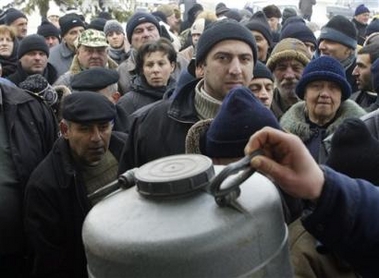|
Iran, Georgia strike gas deal amid crisis
(AP)
Updated: 2006-01-28 09:02
Georgia struck a deal with Iran for emergency natural gas supplies Friday, as
the tiny U.S.-ally suffered through its worst energy crisis in years and
government officials accused Russia of waging an energy blockade.
Dawn-to-dusk lines persisted in the capital Tbilisi for a second day, as
desperate Georgians queued up for kerosene and firewood to heat their homes amid
the largest snowfall in years. Many from the former Soviet republic, from
President Mikhail Saakashvili down to those shivering in below-freezing
temperatures in the capital, struck a note of defiance.
"It's an energy blockade. That's what it is," said 58-year-old Bichiko
Gveseladze, who waited six hours along at least 500 other people for
government-subsidized kerosene. "Russia is doing it because they don't want
Georgia to be fully independent."
Nearly a week after explosions shut down a gas pipeline in a Russian border
region and nearly two days after winter weather downed a major electric
transmission line, Georgian officials announced a deal that sees Tehran
supplying 71 million cubic feet of gas a day via Azerbaijan pipelines.

Georgians line up to get kerosene in Tbilisi,
Georgia, Friday, Jan. 27, 2006.[AP] | Saakashvili, a pro-Western leader who has built close ties with Washington as
he pursues his goal of ending Russian influence, told his Cabinet that Iran had
agreed to supply gas via Azerbaijan no later than Monday.
Standing in a slushy street, a shivering Mimosa Maisuradze, 49, held up her
right hand to show a reporter the number 428 — inked on at 8 a.m. when she lined
up for kerosene at a filling station.
"What else are going to do?" she said. "I believe in (Saakashvili), but I
believe more in God."
Down the hill, the smell of wood smoke hung over several dozen people as they
angrily pressed against a government truck where members of the president's
political party were handing out free firewood.
"This is only political. All of this crisis," said Boris Khvibliani, a
65-year-old retired energy sector worker. "This is the 21st century. (Russia)
wants everything. Enough already."
The head of Georgia's International Gas Corporation, David Ingorovka, told
Rustavi-2 TV from Tehran that technical details for transporting the gas via
Azerbaijan needed to be worked out. Representatives from Georgia, Iran and
Azerbaijan — itself a major energy supplier — were to meet later Friday in the
Iranian capital.
The deal signals Tbilisi's determination to reduce dependence on Russia — the
world's second largest oil exporter and Europe's largest supplier of natural gas
— and highlights Tehran's importance in the region as an alternative energy
supplier.
"The amount will be enough to restore electric and gas supplies," Saakashvili
said. "Thus we will create a good mechanism of alternative gas sources. And
Russia should be aware of this."
Saakashvili declined to say how much Iran was charging, but some Georgian
reports said Iran was asking $120 per 1,000 cubic meters — higher than the $110
Russia currently charges.
Underscoring the seriousness of the crisis, Saakashvili cut short a trip to
the World Economic Forum in Switzerland — where he was hoping to sell business
elites on the country's economic prospects — and flew home.
Over the weekend, an explosion on a major gas pipeline that runs through the
Russian border region of North Ossetia cut supplies. The misery worsened early
Thursday when a windstorm downed power lines leading from the Inguri
hydroelectric station to eastern regions, leaving about 3 million people without
electricity.
Then, a Tbilisi power station unit malfunctioned, leaving most of the
capital's 1.5 million residents — more than a third of the country's population
— to scrounge for other heating options as daytime temperatures fell to 18
degrees.
Saakashvili has suggested that Russia was stalling repairs of the gas
pipeline to punish the country and recent pro-Western policies — suspicions
shared by many Georgians. Russian officials have rejected the allegations,
blaming the blasts on sabotage, and said the repairs are close to completion.
The 1991 Soviet collapse and civil war in the early 1990s left much of
Georgia's energy infrastructure decrepit and in desperate need of repair,
forcing many to rely on generators and wood- and gas-fired heaters and stoves.
In recent years, the situation had stabilized with fewer outages and
Saakashvili, who came to power on the wave of the 2003 Rose Revolution, had
restored optimism for many Georgians.
Georgia's closer cooperation with Tehran could lead to awkward questions from
the United States, which is seeking Iran's referral to the Security Council for
reopening its uranium enrichment program — work that could give it the capacity
to make nuclear weapons. Yet as relations with Moscow become increasingly
strained, Georgia's energy options are limited, analysts say.
"What are the alternatives?" said Kakha Kiknavelidze of Brunswick UBS in
Moscow. "Iran, or to be left without gas."
|